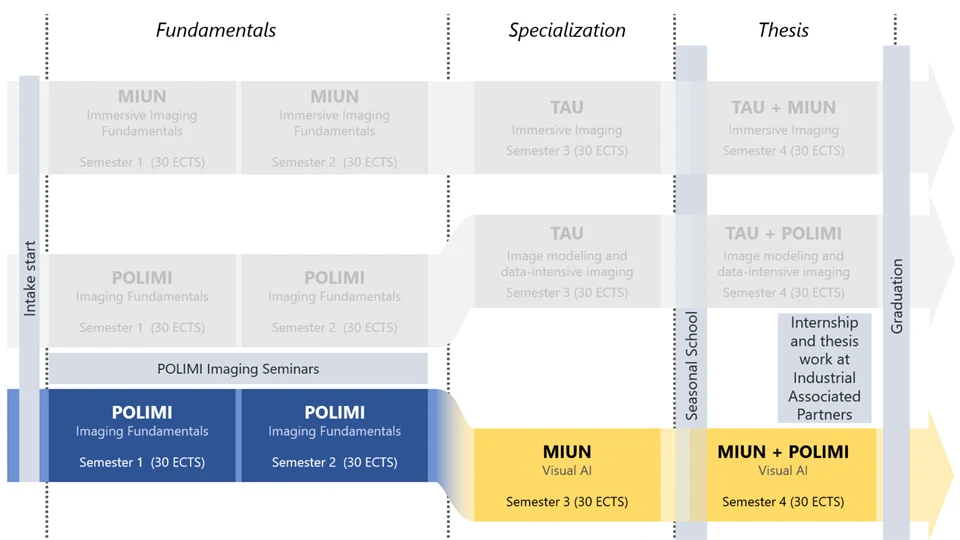Visual AI Track
Experience the revolution at the crossroads of AI and visual brilliance with Visual AI. As you delve into this track, you will arm yourself with the knowledge to architect the future, crafting tomorrow's visual wonders today.
Visual AI
In this dedicated track, you will delve into how artificial intelligence, including machine learning and deep learning, plays a role in visual processing. You will explore areas like image and video processing, efficient compression methods for visual content, data visualisation, and the basics of computer vision and computer graphics. Additionally, you will get a glimpse into the fascinating world of 3D visual representations, augmented reality, and virtual reality. These technologies and methods are not just theories; they are tools that are shaping our digital experiences every day. By the conclusion, you will have a richer understanding of how these innovations influence our digital age.
Courses
Within the Visual AI track, the following courses are given to support you in your journey of becoming an imaging expert.
Year one at Politecnico di Milano:
- Software Engineering II, 5 ECTS
- Artificial Neural Networks and Deep Learning, 5 ECTS
- Foundations of Operations Research, 5 ECTS
- Image Analysis and Computer Vision, 5 ECTS
- Fundamentals of Multimedia Signal Processing, 5 ECTS
- Advanced Computer Architectures, 5 ECTS
- Computing Infrastructures, 5 ECTS
- Machine Learning, 5 ECTS
- Applied Statistics, 10 ECTS
- Two elective courses (in total - 10 ECTS)
- Imaging Seminars at Politecnico di Milano
- Imaging Seminars are an innovative educational tool, designed to instruct students about the practical challenges and recent trends in imaging science and technology. Seminars will host presenters from both academic and industrial associated partners visiting Politecnico di Milano. Furthermore, these seminars will constitute a unique opportunity to help students to tailor their study plans to what mostly fit their interests and career goals and to identify a related thesis topic accordingly.
Year two at Mid Sweden University, Campus Sundsvall:
- Advanced Image Processing, 6 ECTS
- Multi-dimensional Visual Representation and Compression, 6 ECTS
- Augmented and Virtual Reality, 6 ECTS
- Machine Learning for Visual Media Applications, 6 ECTS
- Quantitative Research and Development, 6 ECTS
- Final Project, 30 ECTS
The master’s degree project
The degree project amounts to one full semester of full-time work and is normally undertaken during the last semester. The project is carried out in the area defined by and relevant to the courses taken during the programme. The thesis project will be jointly supervised by professors at Mid Sweden University and Politecnico di Milano.
Track requirements
There are following requirements for Visual AI track:
- The students should be eligible for application and admission (check Application and Admission page)
- The selected students need to be admitted to two programs in both Politecnico di Milano and Mid Sweden University:
- Computer Science and Engineering, at Politecnico di Milano
- Erasmus Mundus Joint Master's Programme in Imaging, at Mid Sweden University
- To advance to the second year at Mid Sweden University, students must have earned at least 45 credits from the first-year courses at Politecnico di Milano before the start of year 2.
- Students must satisfy the degree requirements of both institutions, i.e., complete the offered courses.
Type of degree
The successful completion of the curriculum is rewarded by two diplomas from Politecnico di Milano and Mid Sweden University for the “Visual AI” track. The degrees will be:
- Master of Science in Computer Science and Engineering for Politecnico di Milano, and
- Master of Science in Computer Engineering for Mid Sweden University.
After the programme
Graduates of this comprehensive master's program possess a unique fusion of skills that open doors to a plethora of employment opportunities. With foundational knowledge in software engineering, artificial neural networks, deep learning, operations research, image analysis, computer vision, multimedia signal processing, and applied statistics, they are well-prepared to delve into roles as software developers, machine learning engineers, and data analysts across diverse industries. Their expertise in advanced image processing, multi-dimensional visual representation, augmented and virtual reality, and machine learning for visual media applications makes them particularly coveted in sectors such as healthcare (for medical imaging), defence (for surveillance systems), entertainment (for gaming and video enhancements), and tech enterprises focused on AR/VR innovations.
Furthermore, the curriculum's focus on advanced computer engineering topics and quantitative research and development equips them for roles in various positions, including research-centric positions in academia and corporate R&D departments. The breadth of courses, combined with the hands-on experience from the final project, not only prepares students for established tech giants but also primes them for innovative startups, potentially leveraging their final projects as the basis for entrepreneurial ventures in the tech domain.

